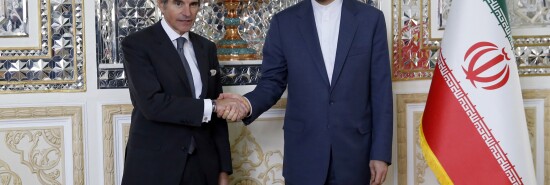
Iran is on the verge of a nuclear bomb and now promises to proliferate it
Michael Rubin
Video Embed
When historians write the history of Iran’s nuclear program, Washington’s partisan bickering will play a major role.
Beginning with former President Bill Clinton and his Secretary of State Madeleine Albright, partisan officials preferred to blame their predecessors for Iran’s nuclear progress rather than acknowledge their adversaries had agency.
DOCKWORKER TALKS THREATEN BIDEN WITH ANOTHER TOUGH DECISION BETWEEN LABOR AND ECONOMY
In 2005, the International Atomic Energy Agency referred Iran to the United Nations Security Council because of Iran’s persistent cheating and stonewalling. Concerns about Iran’s nuclear activity have no parallel in faulty Iraq intelligence: The intelligence that led the United States to war in Iraq was both secret and flawed. Saddam Hussein’s bluffs led both human and signals intelligence to affirm each other based on corrupt information.
Iran is different. Inspection discrepancies root every accusation about Iran’s nuclear ambitions. These culminated in the IAEA’s 2011 compilation of the unexplained “possible military dimensions” of Iran’s program. Iranian diplomats might insist their nuclear program is for energy purposes only, but this does not explain why they experimented with warhead design, neutron initiators, or mathematical modeling for nuclear explosions.
This dynamic of giving Iran a free pass accelerated under former President Barack Obama for several reasons.
First, ego and naivete convinced Iranian leaders they faced no real consequence. Jake Sullivan, a young aide to Secretary of State Hillary Clinton who had no experience in the Middle East, bit on an Iranian offer to negotiate that more experienced Iran hands saw as largely insincere. That he embraced talks on topics where the U.N. Security Council had ruled firmly and unanimously against Iran surprised even Tehran. He believed he could privilege so-called reformists over hard-liners, never understanding that the difference between the two camps was one of style rather than substance.
Second, Obama’s team bungled leverage. According to then-President Hassan Rouhani, Iran’s economy shrank 5.4% in the year prior to the initiation of talks. Iranians must have been surprised when Obama agreed to provide $1 billion monthly to Iran while it negotiated, especially because American diplomats were in a much better position to extract concessions when the Iranian regime lacked the money even to pay salaries. Obama’s refusal to define a best alternative to a negotiated agreement in favor of straw man arguments about his deal or war only convinced Iranian leaders further they need not compromise.
Third, Obama conflated the Islamic Revolutionary Guard Corps with the Iranian people. The Revolutionary Guard’s economic wing controls 40% of Iran’s economy. Lifting sanctions and unfreezing assets that flow into the Revolutionary Guard’s businesses bolsters the nuclear program, not retards it.
Today, Iran is on the verge of a nuclear breakout. It may be easy to blame former President Donald Trump’s exit from the 2015 deal for Iran’s nuclear enrichment, but the real correlation was not leaving the Joint Comprehensive Plan of Action, but rather President Joe Biden’s decision to end maximum pressure.
Regardless, while many diplomats base their calculation on Iran acquiring 20 kilograms of uranium enriched to 90%, the notion that Tehran seeks perfection is nonsense. The bomb dropped on Hiroshima was only approximately 80% enriched. Lower-enriched dirty bombs might not have the bang, but they can still transform key cities into wastelands incapable of sustaining human life.
The problem may not simply be Iran’s Islamic Republic possessing an atomic bomb. On Sunday, Supreme Leader Ali Khamenei discussed the future directions of Iran’s nuclear program.
“Iran’s nuclear products and services must be commercialized,” he explained. “There is a good demand for our achievements in the international markets and these can be used to the benefit of the country’s economy and income. There should be cooperation with allied countries.”
Allied countries, of course, mean Syria, Venezuela, and Cuba, or even Hezbollah and some Mexican drug cartels. The problem is no longer simply the threat that Iran might use nuclear weapons against Israel, Saudi Arabia, or U.S. forces in the region. It is now that Iran will trade nukes for cash, including in the Western hemisphere.
The time for partisan bickering and finger-pointing is over.
CLICK HERE TO READ MORE FROM THE WASHINGTON EXAMINER
Michael Rubin (@mrubin1971) is a contributor to the Washington Examiner’s Beltway Confidential blog. He is a senior fellow at the American Enterprise Institute.
